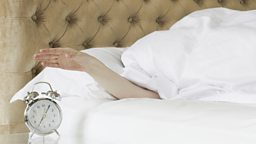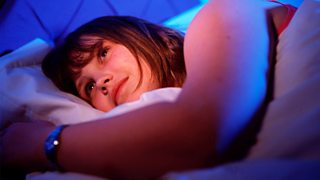Radio 4's guide to a good night's sleep
And... stretch! How do you feel today? Bit groggy? Is it hard to concentrate? You may be suffering from sleep deprivation. Research shows that the majority of us don’t get enough kip, and what we do get isn't good enough. Here’s our gold standard guide to satisfying sleep.

1. Toasty tootsies
Temperature has a big part to play in optimum sleep conditions. A 1985 study showed that having a warm bath before bed relaxes you (and actually gives you better quality sleep), and you cool down rapidly before climbing into your jimjams. This drop in temperature mimics the drop in temperature that you experience before falling asleep, so it’s a useful pre-snooze exercise. A 1999 study, however, showed that warm extremities sped up the dropping-off process, so you might want to consider bed socks. Not glamorous or sexy, but then neither’s that threadbare dressing gown.
2. The magic number
If you can, go to bed by 11pm, because your body creates a surge of the hormone cortisol after that time which will keep you awake.
3. Two shifts
In the Middle Ages, we slept in two shifts. We had a few hours after the sun went down, then we got up, pottered about, tended the fire, prayed or did whatever else we fancied. We then returned to bed in the early hours and slept until dawn. It was the advent of electricity that changed this pattern. Now we’re not suggesting you adopt this practice, but it does tell us something about how electric light has changed our sleep patterns. Research conducted in the Chago region of Argentina showed that people with free access to electricity fell asleep later and slept around one hour a night less than those who relied on natural light. This is also why you need to turn your phone OFF one hour before you want to go to bed. No excuses. The blue light affects your suprachiastmatic nucleus, which controls sleep.
4. Midnight feast
Casually raiding the fridge in an ad break or deciding that you really need a bacon sandwich at 11.30pm is the best way to guarantee a night spent tossing, turning and dreaming that you’re presenting the sales figures in a sarong. Leave a four-hour gap after food before bedtime, and an eight-hour gap after caffeine.
5. Sleeping companions
Apart from money and who puts the empty milk cartons back in the fridge, incompatible sleeping can be a huge source of rage for cohabitees. If you are sharing the bed with someone who likes to be polar while you’re more tropical, make the bed with two sheets and a duvet on top. This minimises duvet strops in the middle of the night.
6. Getting there
Some of us feel physically exhausted and mentally sluggish until our head hits the pillow, whereupon our brains decide it’s vital that they remember the name of the girl we sat next to in Biology in the fifth year. This can be conquered by deep breathing, which stimulates the parasympathetic nervous system and calms us. Deep breaths in through the nose for a count of four, out for a count of seven.
7. Don’t worry
“Right, OK. If I go to sleep in the next fifteen minutes I’ll get five-and-a-quarter hours’ sleep - oh that’s not enough...” Been there? Nothing is going to make you less relaxed and ready for sleep than the countdown of how exhausted you are going to feel tomorrow. Give it twenty minutes - if you’re not even drowsy, leave the bed and go and read (DON’T go on your phone or laptop). If you get slightly chilly, all the better. Then come back and try again. And if you have to write off a night’s sleep, never mind - think how well you’ll sleep the next night.
8. Wakey wakey
We’d all prefer our waking to be more “aaaah” and less “AAAGH!” There are many apps that monitor your sleep and wake you when you are at the top of a sleep cycle, nearest to wakefulness. And rather than using a horrible mobile phone beep or intrusive ding-a-ling, why not wake up to the soothing tones of the radio? We suggest Radio 4. But then we would, wouldn't we?
9. Warm and cosy?
Now unless you are someone who actually likes the burning airlock that is a hotel bedroom, most of us prefer a cool bedroom, and that’s because we know we sleep better. Aim for somewhere between 60 and 67 degrees Fahrenheit, and have a window open slightly.




